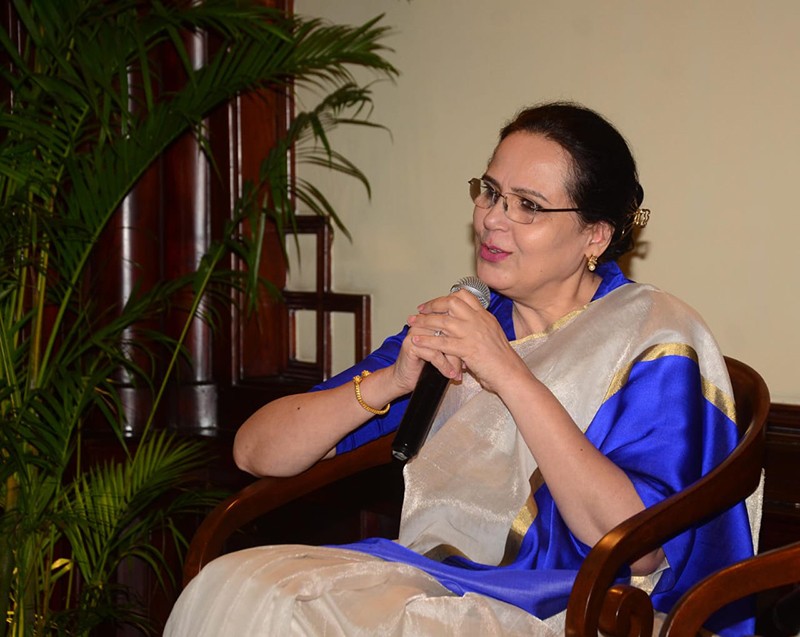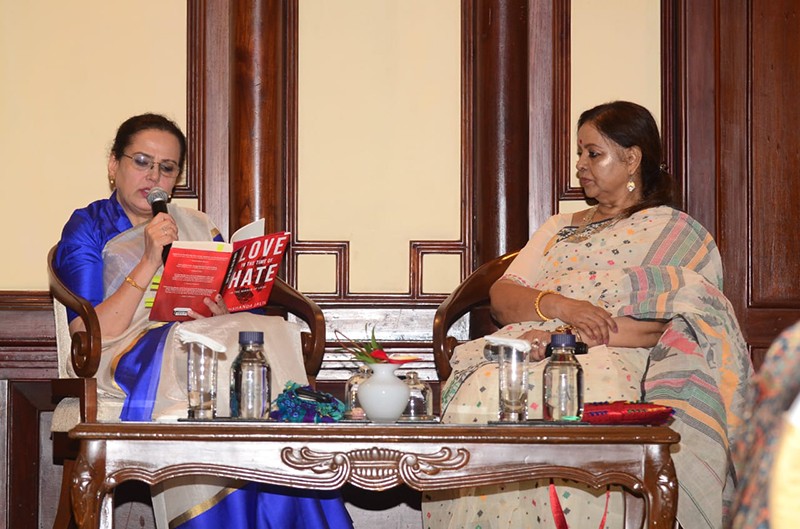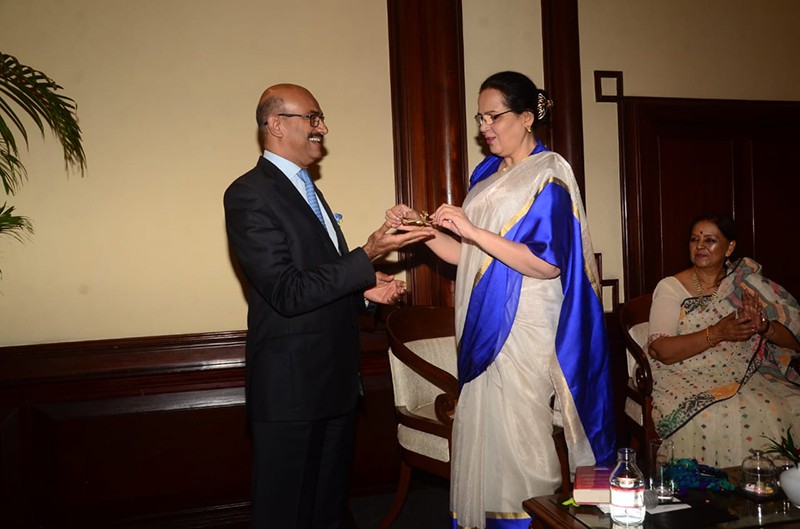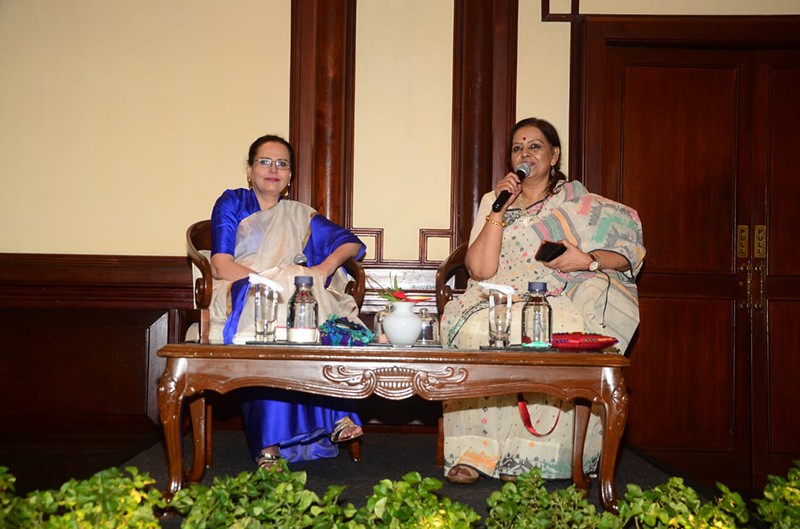 Photo courtesy: PKF
Photo courtesy: PKF
I am interested in Urdu, not obsessed with it: Writer Rakshanda Jalil
Indian writer-translator Rakshanda Jalil was the guest at An Author's Afternoon, organised by Prabha Khaitan Foundation, at Taj Bengal in Kolkata on Friday. IBNS correspondent Souvik Ghosh pens down Jalil's words on her education, teaching profession, Urdu and her PhD. topic. Excerpts...
Q. Tell us about your early days.
A. I was a teacher. It was expected of people and nerds like me, coming from a family which had teachers, to opt for teaching. I did try teaching, first in Khalsa college of Delhi University and briefly at Aligarh University but my heart was never on the job. Back in those days, people used to do higher education straightaway after school. I did PhD. later in my life. Also in those days, it was easy to get those jobs after doing M.A. There was no such rush in getting jobs back then. Delhi University then had a very simple process to get the job. It might be the case that I didn't value it or I understood I was not meant for it. I was not sure, maybe.
 Photo courtesy: PKF
Photo courtesy: PKF
Q. What were your early influences towards Urdu because we don't come across many who are fond of their languages growing up in Delhi or UP?
A. In my family, we used to leave behind the English language outside and enter the house. There was no written rule but we never used to speak in English at home. My both parents were perfectly literate and cosmopolitan people in their own way but it was an unspoken rule that we would speak in Urdu at home.
We had to speak in English outside the house, of course. But I used to speak very domestic Urdu. Even now, I speak Urdu very fluently but I don't have critical idioms. I did indeed come from a home where neither parent had studied Urdu formally but we had Urdu books in the house. I went to a school where there were a whole bunch of languages on offer as a third language option. Urdu was one of them.
I remember one Mr. Bhasin, who was the transport incharge and a refugee from the other side of the partition or a partition survivor, whose pronunciation of Urdu introduced the language to me. I have huge debt of gratitude towards Mr. Bhasin for my Urdu. He was also an Urdu teacher who taught me the language in classes 6, 7 and 8.
Q. Why did you take more than a 20-year gap in doing PhD after M.A.?
A. Nowadays, I see students taking a few years' gap here and there in pursuing higher education. But in my time, it was a very linear approach when it came to education. I don't see the benefit of that kind of approach because there is no age bar for higher education. The age bar in elementary education is backed by common sense and logic. But there is absolutely no common sense and logic in wanting to do your higher education right away, I think. If one gives time, he/she ruminates over a whole bunch of things and chooses a subject. I see a lot of people are so confused over their choices of MPhil. and PhD. subject because they haven't had enough thought behind it. Somebody like me, who does it 20 years later, is like soil, lying fallow. I see these 20 odd years as a piece of land which doesn't become a wasteland or a desert. It just gets time to rejuvenate itself and yields the growth of sprouts more healthily the moment seeds are thrown into it. No education is a waste neither is time.
 Photo courtesy: PKF
Photo courtesy: PKF
Q. What brought you to the subject of your PhD.?
A. In those 20 odd years, I was reading randomly and was also translating. I think the choice of the thesis, which was the Progressive Writers' Movement, revealed itself to me because by then, I had read so many people that I hadn't consciously thought of as progressive writers. I want to add that there is a great joy in reading for the sake of reading when it is not tied up to gainful employment, promotions and jobs. There is a great joy and liberation in reading for the sheer pleasure of it.
So in my 40s with two small children, a household to run and various family responsibilities, I took a year's leave without pay from the place where I was working, and that's when most of the feeling and surge and travel related to the research happened. I had rented a cubicle at the library of India International Centre in Delhi for six months when I cut myself off from the world and wrote my thesis. I think that was the best time of my life.
Q. Do you feel like having an obsession with Urdu?
A. A lot of people wonder about my so-called obsession with Urdu. Everybody wondered why I fell for Urdu even after doing a Masters in English and teaching the language. I am not obsessed with Urdu. But I think I am uniquely placed for having access to both languages. I enjoy accessing Urdu literature and making it accessible to those who don't have it. So I developed the skill and honed it over the years since 1992 when I first published Prem Chand's Urdu Short Stories. We think of him as a Hindi writer but actually he started out as a Urdu writer. So it was not an obsession but a continuing interest. I find Urdu as a mine and it will keep giving me something or the other if I keep mining it decades after decades.
 Photo courtesy: PKF
Photo courtesy: PKF
Q. How do you see the visible cleansing of Urdu from writings and songs in recent times?
A. I think the Urdu writers, film lyricists have done a huge service in keeping Urdu alive in difficult times. Every time there was a war with Pakistan, Urdu became the enemy. It was strange. There was no logic behind it. So it's the film industry that kept Urdu going. We owe a huge salute to all the filmmakers, who kept the language alive. When Doordarshan had not started, transistors used to play the film songs. Through those transistors, these words used to pierce through the popular imagination. They were cutting across the interiors where government policies could not go.
When the central government wanted to impose Hindi, there were riots in Tamil Nadu but there was no objection to Radio Ceylon or AIR playing Hindi film songs. So that was the reach of cinema and airwaves as media. Popular content is not necessarily pedestrial. That's a mistake we sometimes make. We often consider popular content as something that caters to the lowest common denominator. Not always. Hindi cinema has taught us repeatedly.
Special remarks:
Manisha Jain - Chief Operating Officer - PKF - It was an absolute privilege to host An Author’s Afternoon with the illustrious Dr. Rakhshanda Jalil. Her profound contribution to the literary world as a translator, writer, and historian is commendable. We are honored to have had the opportunity to celebrate her remarkable journey and contributions to literature.
K Mohanchandran - Senior Vice President - Operations- IHCL : I had read "But you don't look like a Muslim" before I met Rakhshanda and now that she is a friend, I can sense the person better, I think. She is very committed to searching for the unheard voice and highlighting the need for art & literature to have a social concern too.
Top Headlines
-
Literary
Culturist Sundeep Bhutoria unveils anthology When Gods Don't Matter at Jaipur LitFest 2026
January 17, 2026
-
Literary
Sona College of Technology hosts Think Salem 2025: To spur startup opportunity from Tier-2 Cities
December 23, 2025
-
Literary
A Defiant Voice Remembered: Jyotsna Mohan at The Write Circle, Dubai
September 27, 2025
-
Literary
Feminist pioneer Abala Bose was both a subscriber and critique of colonial ideas: Author Saptarshi Mallick
August 26, 2025
-
Literary
The Sona Story: The Textile to Tech Journey of Chettiar Industrialist C. Valliappa
April 22, 2025
-
Literary
The Sona Story celebrates life, legacy of C. Valliappa
April 05, 2025
-
Literary
Acclaimed Author Soma Bose continues to inspire with her powerful storytelling
March 07, 2025
-
Literary
Terrorists behind Nagrota attack had a jihadi sentiment: 'Nagrota Under Siege' author Bhaavna Arora
February 26, 2025
-
Literary
I am a lifelong Felu-da fan, says Arindam Basu unveiling truth-seeker Prithviraj's intriguing world in 'The Calcutta Covenant'
February 18, 2025
-
Literary
Women decide Indian politics now: Veteran journalist Rajdeep Sardesai at Kitaab talk in Kolkata
January 12, 2025
